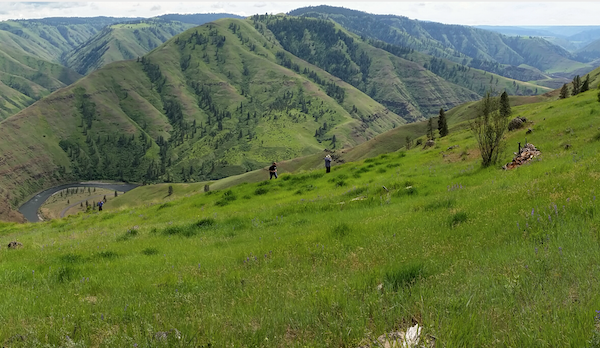
Recovering America’s Wildlife Act Passes US House
Hunting and other traditional conservation organizations are cheering today’s bipartisan passage of the Recovering America’s Wildlife Act in the US House.
Termed “landmark legislation” by Ducks Unlimited, “unprecedented” by Backcountry Hunters and Anglers and the “most significant wildlife conservation bill in half (a) century” by the National Wildlife Federation, RAWA would provide $1.4 billion annually for proactive habitat work for imperiled fish and wildlife.

Funding would be used for species identified in states’ wildlife action plans, mostly nongame critters, but also ones like bighorns and steelhead in Washington’s case. A similar bill sits in the US Senate. To become law, they need to pass Congress and be signed by President Biden.
“RAWA follows a tried-and-true formula for proactive habitat conservation,” said DU CEO Adam Putnam in a press release this afternoon. “We’ve seen other programs, like the Pittman-Robertson Act, utilize this very same conservation methodology to great success. The end result will be healthier habitat that greatly benefits waterfowl and other wildlife, as well as generations of sportsmen and women to come. We thank our friends in the House of Representatives for prioritizing this landmark conservation legislation.”
The bill, also known as HR 2773, passed on a 230-190 vote, with 16 Republicans joining all but two Democrats in favor.
“America’s wildlife are in crisis, with more than 12,000 species at heightened risk of extinction if we fail to act. The bipartisan passage of the Recovering America’s Wildlife Act — the most important wildlife-conservation legislation in a half century — affirms that there is consensus across the political spectrum that we can, and we must, prevent extinctions from our backyards to the backcountry,” said Collin O’Mara, president and CEO of the National Wildlife Federation, in a press release. “Representative Debbie Dingell has worked tirelessly on behalf of this bill for years, and this historic vote cements her legacy as a wildlife champion.”
Cosponsors included all seven Washington and four Oregon Democrats in the House, along with Idaho Republican Mike Simpson.
“State and tribal wildlife action plans have lacked critical funding for far too long,” said BHA Conservation Director John Gale, also in a press release. “RAWA’s scope and potential benefits are unprecedented. This legislation will finally equip states and tribes to draw on a broad range of proven management practices, such as active restoration, invasive species removal, research, watershed management and collaborative management across state lines and tribal lands, to effect successful species recovery.”
WDFW Policy Director Nate Pamplin last year said that his agency has just 5 percent of the funding needed to properly conserve nearly 270 species of “greatest conservation need,” as identified in Washington’s state wildlife action plan.
“Five percent. We’ve got a long ways to go and RAWA is our best bet to close this gap,” he said.
Pamplin pointed out that conserving nongame species benefits harvestable fish and game, and vice versa.
“Hunters and fishers have a lot to be proud of in terms of their contributions to fish and wildlife conservation, and RAWA provides a huge lift to build upon that conservation legacy,” he said.
For Tony Wasley, director of the Nevada Department of Wildlife and president of the Association of Fish and Wildlife Agencies, today’s vote was a “reaffirmation that conservation transcends party lines and politics.”
Referencing the Pittman-Robertson and Dingell-Johnson Acts, which tax the sale of hunting and fishing equipment for conservation and other work, the Alliance for America’s Fish & Wildlife said it’s been decades upon decades that there’s been a chance to pass such important legislation.
Among no votes was Eastern Oregon Rep. Cliff Bentz (R), who said, “We do not have the money” for a $1.4 billion annual program that would continue in perpetuity.
RAWA funding would come from “revenues the government receives from energy and mineral leases on federal lands and waters,” reported the Cornell Lab earlier this month. However, the text of the bill shows it would come from the federal “general fund of the treasury.”
“The Boone and Crockett Club has been at the forefront of wildlife policy for over 130 years and RAWA is an important investment in the future of conservation,” stated Tony A. Schoonen, chief executive officer of the Boone and Crockett Club, in a news release. “We appreciate the vote today by the U.S. House of Representatives to pass this piece of legislation and look forward to working with the Senate to ensure passage of their companion bill this year.”
Clarification: The second to last paragraph has been amended to show the actual funding source for the bill, the federal general fund.
